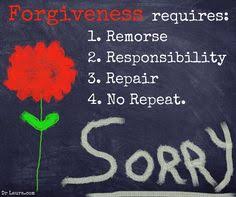I’ve grappled a lot with the idea of forgiveness. What is it, exactly? When is it appropriate? When is it not?
Does forgiveness depend on the transgression?
For example, I was sitting quietly in my window seat on the airplane yesterday morning when my middle-seatmate tossed his laptop bag into his seat as he boarded…except he missed and hit me in the arm instead. He said he was sorry. Pretty innocuous.
What about a sibling who steals your identity and uses it multiple times to steal money out of your bank account, open credit cards they never intend to pay for, and even commit crimes in your name?
On the other end of the spectrum, do you forgive the person who kills your loved one because they were driving drunk?
Transgressions vary wildly in life, don’t they?
So, does the process of forgiveness look the same no matter the offense? It seems to me that many think it does – that no matter the transgression, if you don’t “forgive”, somehow you are the bad person…or that you will be struck down from Karma or God’s wrath.
I call bullshit on this notion.
If you’re a religious person, forgiveness is mentioned multiple times in the bible, seemingly telling its readers to forgive, lest you not be forgiven yourself. No real explanation there. Just a directive.
But life isn’t really that simple, is it?
And when it comes to those that share DNA, do the rules change?
I’m pretty sure that very nice, well-intentioned people believe that DNA does change the rule.
In my case, I get this one all the time:
“But, she’s your mother!”
Anyone else feeling me out there on this one or something similar?
First let me literally laugh my ass off here. And then, as I do, let me digress: if someone is inserting a person’s TITLE in that phrase, as if their transgressions should be OKAY because they have a “title” …. then aren’t they making your point? I mean…shouldn’t the people who are SUPPOSED TO LOVE US not TRANSGRESS AGAINST US? And then if they do, why is it up to us to forgive without anything coming from the other person?
Sigh.
So, for all my confused readers out there, I want to share with you a definition of forgiveness that is so beautiful, that makes so much sense, that it made me weep the first time I heard it (1). I had to go back and listen and look it up and all I could say was:
This. This makes so much sense.
I have it posted in various places so that I can refer to it as I need to. Because let’s face it, I need to on occasion. After all, we all have opportunities to make proper reparations!
But most days, I have to compare this list to my irrational feelings. Because, well, it would just be easier not to make waves and “keep the peace”, wouldn’t it? It would be easier “just to forgive.”
Want to know the steps to forgiveness? Then, remember the 4 R’s!
1. REMORSE
The person tells you they are sorry. They express true remorse. Perhaps this is an expression of words. Perhaps this is an expression of deeds. Perhaps the remorse is communicated in writing. But the expression is overt and is true. Skeptical, are you? Go to step 2, and discern if the person is:
2. TAKING RESPONSIBILITY
In other words, are they not only saying they are sorry, but is this person also owning their own shit? Are they spelling out what they did? Are they communicating their role in the situation? This responsibility is not a result of appeasing your anger or hurt. This responsibility is genuine and real. Still skeptical? Go to step 3:
3. REPAIR
Is the person making steps to repair the situation? For example, if you’ve been spoken about poorly in a circle of friends or loved ones, has the person gone to those people and gone back to Step #2 and taking responsibility for the lies they’ve told? If the problem is between the two of you, have they fixed the problem and made a plan of repair?
If you have steps 1 through 3, then you’re well on your way, aren’t you? But forgiveness isn’t always as easy as forgiving the guy that clocks you with his bag on the airplane.
Sometimes forgiveness takes time, doesn’t it?
And that’s where step 4 comes in:
4. No Repeat
The behavior is not repeated. Over hours, days, months, and years…the person’s actions show, consistently, that they are sorry. Why? Because they don’t do it again.
Forgiveness can be confusing. It certainly can be a messy business, as I will communicate in coming posts.
But, these 4 simple rules – they are something to live by. They are something to measure against. And, they work.
And in the event that the 4 stages of forgiveness do not present themselves to you, take heart, you don’t have to stay bitter, angry, or sad.
You can let go.
Which isn’t the same as forgiveness.
But, it’s actually better. It’s better because it helps you fly. It helps you see clearly. It helps you love yourself no matter what happens against you.
I can’t wait to share that message with you, too.

(1) Dr. Laura Schlesinger – www.drlaura.com
